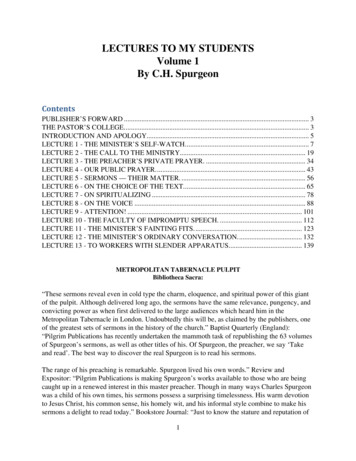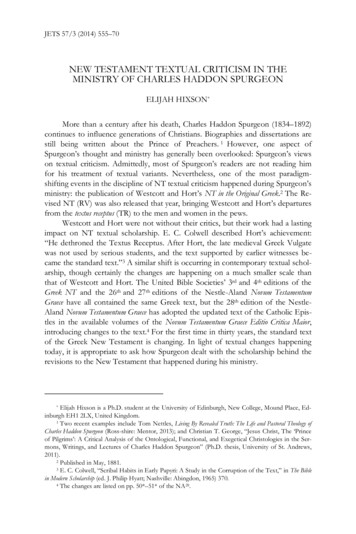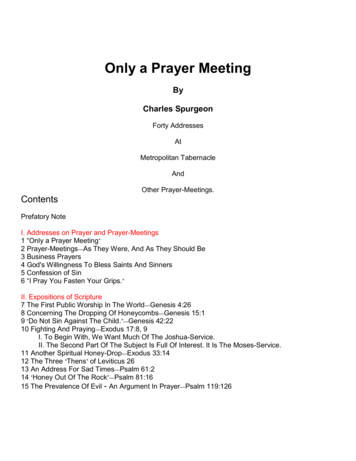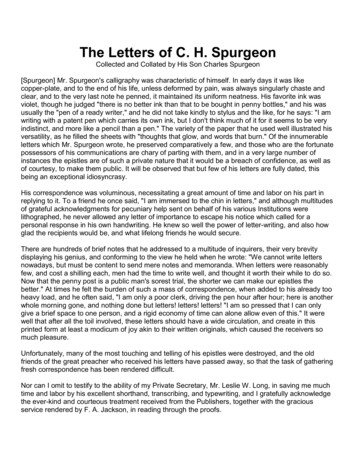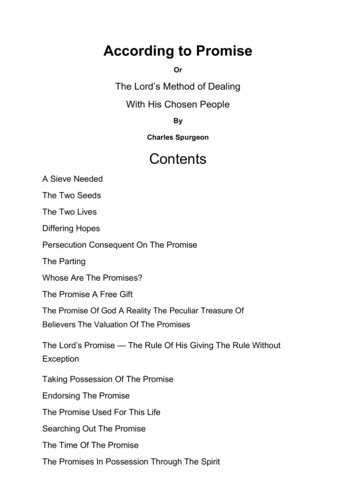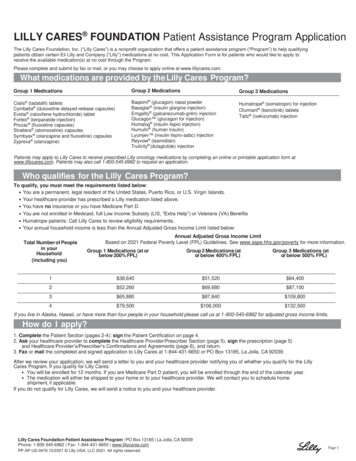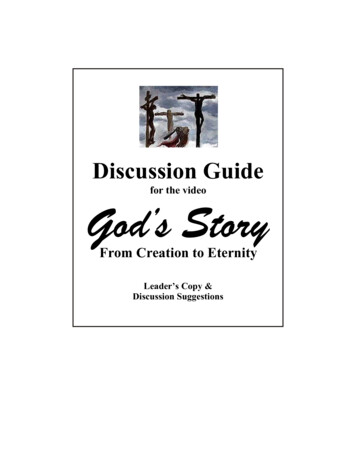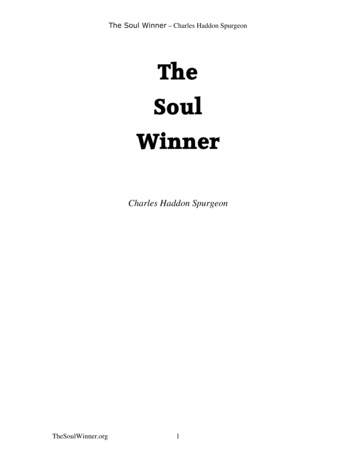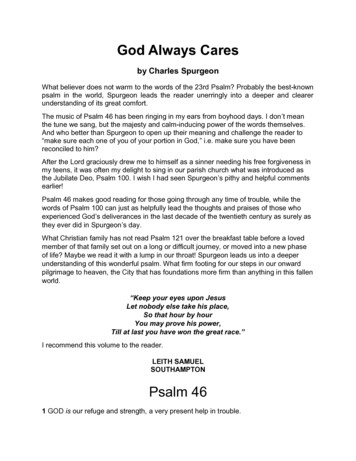
Transcription
God Always Caresby Charles SpurgeonWhat believer does not warm to the words of the 23rd Psalm? Probably the best-knownpsalm in the world, Spurgeon leads the reader unerringly into a deeper and clearerunderstanding of its great comfort.The music of Psalm 46 has been ringing in my ears from boyhood days. I don’t meanthe tune we sang, but the majesty and calm-inducing power of the words themselves.And who better than Spurgeon to open up their meaning and challenge the reader to“make sure each one of you of your portion in God,” i.e. make sure you have beenreconciled to him?After the Lord graciously drew me to himself as a sinner needing his free forgiveness inmy teens, it was often my delight to sing in our parish church what was introduced asthe Jubilate Deo, Psalm 100. I wish I had seen Spurgeon’s pithy and helpful commentsearlier!Psalm 46 makes good reading for those going through any time of trouble, while thewords of Psalm 100 can just as helpfully lead the thoughts and praises of those whoexperienced God’s deliverances in the last decade of the twentieth century as surely asthey ever did in Spurgeon’s day.What Christian family has not read Psalm 121 over the breakfast table before a lovedmember of that family set out on a long or difficult journey, or moved into a new phaseof life? Maybe we read it with a lump in our throat! Spurgeon leads us into a deeperunderstanding of this wonderful psalm. What firm footing for our steps in our onwardpilgrimage to heaven, the City that has foundations more firm than anything in this fallenworld.“Keep your eyes upon JesusLet nobody else take his place,So that hour by hourYou may prove his power,Till at last you have won the great race.”I recommend this volume to the reader.LEITH SAMUELSOUTHAMPTONPsalm 461 GOD is our refuge and strength, a very present help in trouble.
2 Therefore will not we fear, though the earth be removed, and though the mountainsbe carried into the midst of the sea;3 Though the waters thereof roar and be troubled, though the mountains shake withthe swelling thereof. Selah.4 There is a river, the streams whereof shall make glad the city of God, the holy placeof the tabernacles of the Most High.5 God is in the midst of her; she shall not be moved: God shall help her, and thatright early.6 The heathen raged, the kingdoms were moved: he uttered his voice, the earthmelted.7 The LORD of hosts is with us; the God of Jacob is our refuge. Selah.8 Come, behold the works of the LORD, what desolations he hath made in the earth.9 He maketh wars to cease unto the end of the earth; he breaketh the bow, and cutteththe spear in sunder; he burneth the chariot in the fire.10 Be still, and know that I am God: I will be exalted among the heathen, I will beexalted in the earth.11 The LORD of hosts is with us; the God of Jacob is our refuge. Selah.1. “God Is Our Refuge And Strength.” Not our armies, or our fortresses. Israel’s boast isin Jehovah, the only living and true God. Others vaunt their impregnable castles placedon inaccessible rocks and secured with gates of iron, but God is a far better refuge fromdistress than all these. And when the time comes to carry the war into the enemy’sterritories, the Lord stands his people in better stead than all the valor of legions or theboasted strength of chariot and horse. Soldiers of the cross, remember this, and countyourselves safe, and make yourselves strong in God. Forget not the personalpossessive word “our;” make sure, each one of your portion in God, that you may say,“He is my refuge and strength.” Neither forget the fact that God is our refuge just now, inthe immediate present, as truly as when David penned the word. God alone is our all inall. All other refuges are refuges of lies; all other strength is weakness, for powerbelongeth unto God. But as God is all-sufficient, our defense and might are equal to allemergencies.“A very present help in trouble,” or in distresses he has so been found, he has beentried and proved by his people. He never withdraws himself from his afflicted. He is theirhelp, truly, effectually, constantly; he is present or near them, close at their side andready for their succor, and this is emphasized by the word “every” in our version. He ismore present than friend or relative can be, yea, more nearly present than even thetrouble itself. To all this comfortable truth is added the consideration that his assistancecomes at the needed time. He is not as the swallows that leave us in the winter; he is afriend in need and a friend indeed. When it is very dark with us, let brave spirits say,
“Come, let us sing the forty-sixth Psalm”.“A fortress firm, and steadfast rock,Is God in time of danger;A shield and sword in every shock,From foe well-known or stranger”.2. “Therefore.” How fond the psalmist is of therefores! his poetry is no poetic rapturewithout reason; it is as logical as a mathematical demonstration. The next words are anecessary inference from these. “Will not we fear.” With God on our side how irrationalwould fear be! Where he is all power is and all love. Why therefore should we quail?“Though the earth be removed,” though the basis of all visible things should be soconvulsed as to be entirely changed. “And though the mountains be carried into themidst of the sea;” though the firmest of created objects should fall to headlong ruin andbe submerged in utter destruction. The two phrases set forth the most terriblecommotions within the range of imagination and include the overthrow of dynasties, thedestruction of nations, the ruin of families, the persecutions of the church, the reign ofheresy, and whatever else may at any time try the faith of believers. Let the worst cometo the worst, the child of God should never give way to mistrust. Since God remainethfaithful there can be no danger to his cause or people. When the elements shall meltwith fervent heat, and the heavens and the earth shall pass away in the last generalconflagration, we shall serenely behold “the wreck of matter, and the crash of worlds,”for even then our refuge shall preserve us from all evil; our strength shall prepare us forall good.3. “Though the waters thereof roar and be troubled.” When all things are excited to furyand reveal their utmost power to disturb, faith smiles serenely. She is not afraid ofnoise, nor even of real force. She knows that the Lord stills the raging of the sea andholds the waves in the hollow of his hand. “Though the mountains shake with theswelling thereof.” Alps and Andes may tremble, but faith rests on a firmer basis and isnot to be moved by swelling seas. Evil may ferment, wrath may boil, and pride mayfoam, but the brave heart of holy confidence trembles not. Great men who are likemountains may quake for fear in times of great calamity, but the man whose trust is inGod needs never be dismayed.“Selah.” In the midst of such a hurly-burly the music may well come to a pause, both togive the singers breath and ourselves time for meditation. We are in no hurry, but cansit us down and wait while earth dissolves, and mountains rock, and oceans roar. Oursis not the headlong rashness which passes for courage. We can calmly confront thedanger and meditate upon terror, dwelling on its separate items and united forces. Thepause is not an exclamation of dismay, but merely a rest in music; we do not suspendour song in alarm, but retune our harps with deliberation amidst the tumult of the storm.It were well if all of us could say, “Selah,” under tempestuous trials, but alas! too oftenwe speak in our haste, lay our trembling hands bewildered among the strings, strike thelyre with a rude crash, and mar the melody of our life-song.4. There is a river. Divine grace like a smoothly flowing, fertilising, full, and never-failing
river, yields refreshment and consolation to believers. This is the river of the water oflife, of which the church above as well as the church below partakes evermore. It is noboisterous ocean, but a placid stream. It is not stayed in its course by earthquakes orcrumbling mountains; it follows its serene course without disturbance. Happy are theywho know from their own experience that there is such a river of God.“The streams whereof” in their various influences, for they are many, “shall make gladthe city of God,” by assuring the citizens that Zion’s Lord will unfailingly supply all theirneeds. The streams are not transient like Cherith, nor muddy like the Nile, nor furiouslike Kishon, nor treacherous like Job’s deceitful brooks, neither are their waters“naught” like those of Jericho; they are clear, cool, fresh, abundant, and gladdening.The great fear of an Eastern city in time of war was lest the water supply should becut off during a seige. If that were secured the city could hold out against attacks foran indefinite period.In this verse, Jerusalem, which represents the church of God, is described as wellsupplied with water, to set forth the fact, that in seasons of trial all-sufficient grace willbe given to enable us to endure unto the end. The church is like a well-ordered city,surrounded with mighty walls of truth and justice, garrisoned by omnipotence, fairly builtand adorned by infinite wisdom. Its burgesses the saints enjoy high privileges; theytrade with far-off lands, they live in the smile of the King. And as a great river is the verymaking and mainstay of a town, so is the broad river of everlasting love and grace theirjoy and bliss. The church is peculiarly the “City of God,” of his designing, building,election, purchasing and indwelling. It is dedicated to his praise and glorified by hispresence.“The holy place of the tabernacles of the Most High.” This was the peculiar glory ofJerusalem, that the Lord within her walls had a place where he peculiarly revealedhimself, and this is the choice privilege of the saints, concerning which we may cry withwonder, “Lord, how is it that thou wilt manifest thyself unto us, and not unto the world?”To be a temple for the Holy Ghost is the delightful portion of each saint, to be the livingtemple for the Lord our God is also the high honor of the church in her corporatecapacity. Our God is here called by a worthy title, indicating his power, majesty,sublimity, and excellency. And it is worthy of note that under this character he dwells inthe church. We have not a great God in nature and a little God in grace. No, the churchcontains as clear and convincing a revelation of God as the works of nature, and evenmore amazing in the excellent glory which shines between the cherubim overshadowingthat mercy seat which is the center and gathering place of the people of the living God.To have the Most High dwelling within her members, is to make the church on earth likethe church in heaven.5. “God is in the midst of her.” His help is therefore sure and near. Is she besieged, thenhe is himself besieged within her, and we may be certain that he will break forth uponhis adversaries. How near is the Lord to the distresses of his saints, since he sojournsin their midst! Let us take heed that we do not grieve him; let us have such respect tohim as Moses had when he felt the sand of Horeb’s desert to be holy and put off his
shoes from off his feet when the Lord spake from the burning bush.“She shall not be moved.” How can she be moved unless her enemies move her Lordalso? His presence renders all hope of capturing and demolishing the city utterlyridiculous. The Lord is in the vessel, and she cannot, therefore, be wrecked. “God shallhelp her.” Within her he will furnish rich supplies, and outside her walls he will lay herfoes in heaps like the armies of Sennacherib when the angel went forth and smotethem.“And that right early.” As soon as the first ray of light proclaims the coming day, at theturning of the morning God’s right arm shall be outstretched for his people. The Lord isup betimes. We are slow to meet him, but he is never tardy in helping us. Impatiencecomplains of divine delays, but in very deed the Lord is not slack concerning hispromise. Man’s haste is often folly, but God’s apparent delays are ever wise. And,when rightly viewed, are no delays at all. Today the bands of evil may environ thechurch of God and threaten her with destruction. But ere long they shall pass away likethe foam on the waters, and the noise of their tumult shall be silent in the grave. Thedarkest hour of the night is just before the turning of the morning. And then, even then,shall the Lord appear as the great ally of his church.6. “The heathen raged.” The nations were in a furious uproar; they gathered against thecity of the Lord like wolves ravenous for their prey. They foamed and roared andswelled like a tempestuous sea. “The kingdoms were moved.” A general confusionseized upon society; the fierce invaders convulsed their own dominions by draining thepopulation to urge on the war, and they desolated other territories by their devastatingmarch to Jerusalem. Crowns fell from royal heads, ancient thrones rocked like treesdriven of the tempest, powerful empires fell like pines uprooted by the blast. Everythingwas in disorder, and dismay seized on all who knew not the Lord.“He uttered his voice, the earth melted.” With no other instrumentality than a word theLord ruled the storm. He gave forth a voice and stout hearts were dissolved, proudarmies were annihilated, conquering powers were enfeebled. At first the confusionappeared to be worse confounded when the element of divine power came into view.The very earth seemed turned to wax, the most solid and substantial of human thingsmelted like the fat of rams upon the altar. But anon peace followed, the rage of mansubsided, hearts capable of repentance relented, and the implacable were silenced.How mighty is a word from God! How mighty the Incarnate Word. O that such a wordwould come from the excellent glory even now to melt all hearts in love to Jesus andto end for ever all the persecutions, wars, and rebellions of men!7. “The Lord of hosts is with us.” This is the reason for all Zion’s security and for theoverthrow of her foes. The Lord rules the angels, the stars, the elements, and all thehosts of heaven. And the heaven of heavens are under his sway. The armies of menthough they know it not are made to subserve his will. This General of the forces of thehind, and the Lord High Admiral of the seas is on our side — our august ally. Woe untothose who fight against him, for they shall fly like smoke before the wind when he gives
the word to scatter them. “The God of Jacob is our refuge.” Immanuel is Jehovah ofHosts, and Jacob’s God is our high place of defense. When this glad verse is sung tomusic worthy of such a jubilate, well may the singers pause and the players wait awhileto retune their instruments. Here, therefore, fitly stands that solemn, stately, peacefulnote of rest. SELAH.8. “Come, behold the works of the Lord.” The joyful citizens of Jerusalem are invited togo forth and view the remains of their enemies, that they may mark the prowess ofJehovah and the spoil which his right hand hath won for his people. It were well if wealso carefully noted the providential dealings of our covenant God, and were quick toperceive his hand in the battles of his church. Whenever we read history it should bewith this verse sounding in our ears. We should read the newspaper in the same spirit,to see how the Head of the Church rules the nations for his people’s good, as Josephgoverned Egypt for the sake of Israel. What desolations he hath made in the earth.” Thedestroyers he destroys; the desolators he desolates. How forcible is the verse at thisdate! The ruined cities of Assyria, Babylon, Petra, Bashan, Canaan, are our instructors,and in tables of stone record the doings of the Lord. In every place where his cause andcrown have been disregarded, ruin has surely followed. Sin has been a blight on nationsand left their palaces to lie in heaps. In the days of the writer of this Psalm, there hadprobably occurred some memorable interposition of God against his Israel’s foes. Andas he saw their overthrow, he called on his fellow citizens to come forth and attentivelyconsider the terrible things in righteousness which had been wrought on their behalf.Dismantled castles and ruined abbeys in our own land stand as memorials of the Lord’svictories over oppression and superstition. May there soon be more of such desolations.“Ye gloomy piles, ye tombs of living men,Ye sepulchres of womanhood, or worse;Ye refuges of lies, soon may ye fall,And ‘mid your ruins may the owl, and bat,And dragon find congenial resting place.”9. “He maketh wars to cease unto the end of the earth.” His voice quiets the tumult fwar and calls for the silence of peace. However remote and barbarous the tribe, heawes the people into rest. He crushes the great powers till they cannot provoke strifeagain; he gives his people profound repose. “He breaketh the bow.” the sender ofswift-winged death he renders useless. “And cutteth the spear in sunder” — the lanceof the mighty man he shivers. “He burneth the chariot in the fire” — the proudwar-chariot with its death-dealing scythes he commits to the flames. All sorts ofweapons he piles heaps on heaps and utterly destroys them. So was it in Judea in thedays of yore; so shall it be in all lands in eras yet to come. Blessed deed of the Princeof Peace! When shall it be literally performed? Already the spiritual foes of his peopleare despoiled of their power to destroy; but when shall the universal victory of peace becelebrated, and instruments of wholesale murder be consigned to ignominiousdestruction? How glorious will the ultimate victory of Jesus be in the day of hisappearing when every enemy shall lick the dust!
10. “Be still, and know that I am God.” Hold off your hands, ye enemies! Sit down andwait in patience, ye believers! Acknowledge that Jehovah is God, ye who feel the terrorsof his wrath! Adore him, and him only, ye who partake in the protections of his grace.Since none can worthily proclaim his nature, let “expressive silence muse his praise.”The boasts of the ungodly and the timorous forebodings of the saints should certainlybe hushed by a sight of what the Lord has done in past ages.“I will be exalted among the heathen .” They forget God, they worship idols, but Jehovahwill yet be honored by them. Reader, the prospect of missions are bright, bright as thepromises of God. Let no man’s heart fail him; the solemn declarations of this verse mustbe fulfilled. “I will be exalted in the earth,” among all people, whatever may have beentheir wickedness or their degradation. Either by terror or love, God will subdue all heartsto himself. The whole round earth shall yet reflect the light of his majesty. All the morebecause of the sin and obstinacy and pride of man shall God be glorified when gracereigns unto eternal life in all corners of the world.11. “The Lord of hosts is with us; the God of Jacob is our refuge.” It was meet to singthis twice over. It is a truth of which no believer wearies, it is a fact too often forgotten, itis a precious privilege which cannot be too often considered. Reader, is the Lord on thyside? Is Emmanuel, God with us, thy Redeemer? Is there a covenant between thee andGod as between God and Jacob? If so, thrice happy art thou. Show thy joy in holysong, and in times of trouble play the man by still making music for thy God.SELAH. Here as before, lift up the heart. Rest in contemplation after praise. Still keepthe soul in tune. It is easier to sing a hymn of praise than to continue in the spirit ofpraise, but let it be our aim to maintain the uprising devotion of our grateful hearts, andso end our song as if we intended it to be continued.SELAH bids the music rest,Pause in silence soft and blest;SELAH bids uplift the strain,Harps and voices tune again;SELAH ends the vocal praise,Still your hearts to God upraise.Psalm 1001 MAKE a joyful noise unto the LORD, all ye lands.2 Serve the LORD with gladness: come before his presence with singing.3 Know ye that the LORD he is God: it is he that hath made us and not we ourselves;we are his people, and the sheep of his pasture.4 Enter into his gates with thanksgiving, and into his courts with praise: be thankful untohim, and bless his name.
5 For the LORD is good; his mercy is everlasting; and his truth endureth to allgenerations.1. “Make a joyful noise unto the Lord, all ye lands.” This is a repetition of the fourthverse of Psalm 98. (Psalm 4:98) The original word signifies a glad shout, such as loyalsubjects give when their king appears among them. Our happy God should beworshipped by a happy people; a cheerful spirit is in keeping with his nature, his acts,and the gratitude which we should cherish for his mercies. In every land Jehovah’sgoodness is seen; therefore in every land should he be praised. Never will the world bein its proper condition till with one unanimous shout it adores the only God. O yenations, how long will ye blindly reject him? Your golden age will never arrive till ye withall your hearts revere him.2. “Serve the Lord with gladness.” “Glad homage pay with awful mirth.” He is our Lord,and therefore he is to be served; he is our gracious Lord, and therefore to be servedwith joy. The invitation to worship here given is not a melancholy one, as thoughadoration were a funeral solemnity, but a cheery gladsome exhortation, as though wewere bidden to a marriage feast.“Come before his presence with singing.” We ought in worship to realize the presenceof God, and by an effort of the mind to approach him. This is an act which must to everyrightly instructed heart be one of great solemnity, but at the same time it must not beperformed in the servility of fear, and therefore we come before him, not with weepingsand wailings, but with psalms and hymns. Singing, as it is a joyful, and at the same timea devout exercise, should be a constant form of approach to God. The measured,harmonious, hearty utterance of praise by a congregation of really devout persons is notmerely decorous but delightful, and is a fit anticipation of the worship of heaven wherepraise has absorbed prayer and become the sole mode of adoration. How a certainsociety of brethren can find it in their hearts to forbid singing in public worship is a riddlewhich we cannot solve. We feel inclined to say with Dr. Watts“Let those refuse to singWho never knew our God;But favorites of the heavenly kingMust speak his praise abroad.”3. “Know that Lord he is God.”Our worship must be intelligent. We ought to know whomwe worship and why. “Man, know thyself,” is a wise aphorism, yet to know our God istruer wisdom; and it is very questionable whether a man can know himself until heknows his God. Jehovah is God in the fullest, most absolute, and most exclusive sense.He is God alone; to know him in that character and prove our knowledge by obedience,trust, submission, zeal, and love is an attainment which only grace can bestow. Onlythose who practically recognize his Godhead are at all likely to offer acceptable praise.“It is he that hath made us, and not we ourselves.” Shall not the creature reverence itsmaker? Some men live as if they made themselves; they call themselves “self-mademen,” and they adore the supposed creators. But Christians recognize the origin of theirbeing and their well-being, and take no honor to themselves either for being or for being
what they are. Neither in our first or second creation dare we put so much as a fingerupon the glory, for it is the sole right and property of the Almighty. To disclaim honor forourselves is as necessary a part of true reverence as to ascribe glory to the Lord. “Nonnobis, domine!” will for ever remain the true believer’s confession. Of late philosophyhas labored hard to prove that all things have been developed from atoms, or have, inother words, made themselves. If this theory shall ever find believers, there will certainlyremain no reason for accusing the superstitious of credulity, for the amount of credencenecessary to accept this dogma of scepticism is a thousandfold greater than that whichis required even by an absurd belief in winking Madonnas and smiling Bambinos. Forour part, we find it far more easy to believe that the Lord made us than that we weredeveloped by a long chain of natural selections from floating atoms which fashionedthemselves.“We are his people, and the sheep of his pasture.” It is our honor to have been chosenfrom all the world besides to be his own people, and our privilege to be therefore guidedby his wisdom, tended by his care, and fed by his bounty. Sheep gather around theshepherd and look up to him; in the same manner let us gather around the greatShepherd of mankind. The avowal of our relation to God is in itself praise; when werecount his goodness we are rendering to him the best adoration; our songs requirenone of the inventions of fictions, the bare facts are enough; the simple narration of themercies of the Lord is more astonishing than the productions of imagination. That weare the sheep of his pasture is a plain truth, and at the same time the very essence ofpoetry.4. “Enter into his gates with thanksgiving.” To the occurrence of the word thanksgiving inthis place the psalm probably owes its title. In all our public service the rendering ofthanks must abound; it is like the incense of the temple, which filled the whole housewith smoke. Expiatory sacrifices are ended, but those of gratitude will never be out ofdate. So long as we are receivers of mercy we must be givers of thanks. Mercy permitsus to enter his gates; let us praise that mercy. What better subject for our thoughts inGod’s own house than the Lord of the house.“And into his courts with praise.” Into whatever court of the Lord you may enter, let youradmission be the subject of praise. Thanks be to God, the innermost court is now opento believers, and we enter into that which is within the veil; it is incumbent upon us thatwe acknowledge the high privilege by our songs.“Be thankful unto him.” Let the praise be in your heart as well as on your tongue, and letit all be for him to whom it all belongs. “And bless his name.” He blessed you, bless himin return; bless his name, his character, his person. Whatever he does, be sure that youbless him for it; bless him when he takes away as well as when he gives; bless him aslong as you live, under all circumstances; bless him in all his attributes from whateverpoint of view you consider him.5. “For the Lord is good.” This sums up his character and contains a mass of reasonsfor praise. He is good, gracious, kind, bountiful, loving; yea, God is love. He who doesnot praise the good is not good himself. The kind of praise inculcated in the psalm, viz.,
that of joy and gladness, is most fitly urged upon us by an argument from the goodnessof God.“His mercy is everlasting.” God is not mere justice, stern and cold; he has bowels ofcompassion and wills not the sinner’s death. Towards his own people mercy is stillmore conspicuously displayed; it has been theirs from all eternity and shall be theirsworld without end. Everlasting mercy is a glorious theme for sacred song.“And his truth endureth to all generations.” No fickle being is he, promising andforgetting. He has entered into covenant with his people and will never revoke it, noralter the thing that has gone out of his lips. As our fathers found him faithful, so will oursons, and their seed for ever. A changeable God would be a terror to the righteous.They would have no sure anchorage, and amid a changing world they would be drivento and fro in perpetual fear of shipwreck. It were well if the truth of divine faithfulnesswere more fully remembered by some theologians; it would overturn their belief in thefinal fall of believers and teach them a more consolatory system. Our heart leaps for joyas we bow before One who has never broken his word or changed his purpose.“As well might he his being quitAs break his promise or forget.”Resting on his sure word, we feel that joy which is here commanded, and in the strengthof it we come into his presence even now and speak good of his name.Psalm 231 The LORD is my shepherd; I shall not want.2 He maketh me to lie down in green pastures: he leadeth be beside the still waters.3 He restoreth my soul: he leadeth me in the paths of righteousness for his name’ssake.4 Yea, though I walk through the valley of the shadow of death, I will fear no evil:for thou art with me; thy rod and thy staff they comfort me.5 Thou preparest a table before me in the presence of mine enemies: thouanointest my head with oil; my cup runneth over.6 Surely goodness and mercy shall follow me all the days of my life: and I willdwell in the house of the LORD for ever.1. “The Lord is my shepherd.” What condescension is this, that the Infinite Lordassumes towards his people the office and character of a Shepherd! It should be thesubject of grateful admiration that the great God allows himself to be compared toanything which will set forth his great love and care for his own people. David hadhimself been a keeper of sheep and understood both the needs of the sheep and themany cares of a shepherd. He compares himself to a creature weak, defenseless, and
foolish, and he takes God to be his Provider, Preserver, Director, and, indeed, hiseverything.No man has a right to consider himself the Lord’s sheep unless his nature has beenrenewed, for the scriptural description of unconverted men does not picture them assheep, but as wolves or goats. A sheep is an object of property, not a wild animal; itsowner sets great store by it, and frequently it is bought with a great price. It is well toknow, as certainly as David did, that we belong to the Lord.There is a noble tone of confidence about this sentence. There is no “if” nor “but,” noreven “I hope so;” but he says, “The Lord is my shepherd.” We must cultivate the spiritof assured dependence upon our he
by Charles Spurgeon What believer does not warm to the words of the 23rd Psalm? Probably the best-known psalm in the world, Spurgeon leads the reader unerringly into a deepe r and clearer understanding of its great comfort. The music of Psalm 46 has been ringing in my ears from boyhood days. I don ¶t mean
